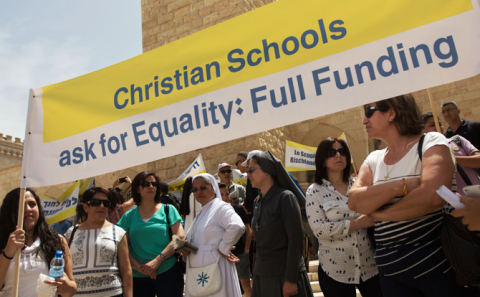Why shut Israel's Christian Schools?
Negotiations to resolve the crisis have, so far, hit a wall. The schools want a budget of around $50 million per year; Israel has offered just $5 million, though the details of a new proposal made on Wednesday have yet to be announced. The ministry claims the schools rejected all its proposals, including that they become part of the state system. Christian school officials contend this would harm their independence and identity. Another option, to reclassify them as “special,” allowing them to charge higher fees, would make them too costly for some families.
Yet the ministry maintains that it does provide the schools with 75 percent of the funding that regular schools get. The rub is that the ministry reduced the state-subsidized teaching hours per student in Christian schools, so the 75 percent is fewer shekels than it used to be. “Our schools don't get equality to other private schools,” is how May Ayoub, 16, sees it. Ayoub is Catholic and goes to school in Haifa. Or at least she will, as soon as the strike is over. By “other schools,” she means institutions in the two “unofficially recognized” ultra-Orthodox school systems – the United Torah Judaism party-affiliated Hinuch Atzmai and the Shas-affiliated Ma’ayan Hahinuch Hatorani. These are almost fully funded by the state.
The protesters further argue that while many Haredi schools don’t teach core subjects like math, Israel’s Christian schools are among the best in the country: twelve are classed as “leading schools,” with grades above the national average.
"We pay taxes"
At the heart of the strike is a demand for fairness, says Reem Abunassar, an English teacher from the Carmelite High School in Haifa, who is also on strike. “We are not immigrants, we are citizens, and we pay taxes,” she says, adding that the situation has made the local Christian community both angry, and depressed: “They feel that they are not equal, that a minister of education in a democratic country doesn’t care about 33,000 students,” She says. Their anger has resonated across the Arab sector: on September 6, some 450,000 pupils from state Arab schools held a solidarity strike. Moreover, Israel’s Union of Teachers is considering an expression of solidarity as well.
Neither Netanyahu nor Education Minister Naftali Bennett has commented publicly about the strike so far. Still, it caught the attention of Pope Francis, who brought it up when he met President Reuven Rivlin at the Vatican this month.
A meeting last week to end the funding deadlock ended with no resolution. A second meeting Wednesday ended with a proposal. School and Church leaders said Thursday that they would send a letter to Bennet asking for clarifications before accepting or rejecting the offer. In the meantime, the strike continues.
And here's a final item of food for thought. According to Botrus Mansour, principal of the Nazareth Baptist School, 87% of Israeli Arabs who work in high-tech come from the Christian Israeli schools.
Alona Ferber

